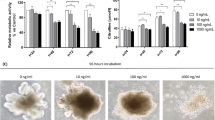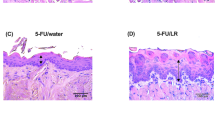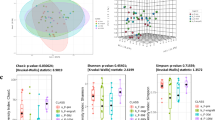Abstract
Background/Objective:
The study was conducted to determine if enteral glutamine, 0.65 g kg−1 daily for 7 days, is effective in reducing the incidence and severity of mucositis in paediatric oncology patients when given alongside chemotherapy. The study was carried out at St James's University Hospital, Leeds, UK.
Subjects/Methods:
This was a randomized study using the patients as their own controls. Seventy-six patients undergoing treatment for paediatric malignancy having at least two identical courses of chemotherapy and at risk of developing mucositis participated in the study. Patients received one course of chemotherapy with glutamine and an identical course without. Alternate patients were allocated to have glutamine with course 1 or with course 2. The severity of symptoms of mucositis and the duration of enteral and parenteral nutrition were recorded. Daily ammonia levels were measured.
Results:
Fifty patients completed the study. No statistical significance with regard to symptoms of mucositis was found. Fewer children receiving glutamine required parenteral nutrition (P=0.049), and the duration of parenteral nutrition was less (P=0.023). No adverse effects attributed to taking the glutamine were observed.
Conclusions:
The study showed that high-dose enteral glutamine did not reduce the incidence and severity of oral mucositis as determined by subjective toxicity measurements, but did show a significant reduction in parenteral nutrition usage. No adverse cumulative effect of this oral glutamine dose was observed.
This is a preview of subscription content, access via your institution
Access options
Subscribe to this journal
Receive 12 print issues and online access
$259.00 per year
only $21.58 per issue
Buy this article
- Purchase on Springer Link
- Instant access to full article PDF
Prices may be subject to local taxes which are calculated during checkout
Similar content being viewed by others
References
Anderson PM, Schroeder G, Skubitz KM (1998). Oral glutamine reduces the duration and severity of stomatitis after cytotoxic cancer chemotherapy. Cancer 83, 1433–1439.
Aquino VM, Harvey AR, Garvin JH, Godder KT, Nieder ML, Adams RH et al. (2005). A double-blind randomised placebo-controlled study of oral glutamine in the prevention of mucositis in children undergoing haematopoietic stem cell transplantation: a paediatric blood and marrow transplant consortium study. Bone Marrow Transplant 36, 611–616.
Buchman AL (1996). Glutamine: is it a conditionally required nutrient for the human gastrointestinal system? J Am Coll Nutr 15, 199–205.
Buchman AL, Moukarzel AA, Bhuta S, Belle M, Ament ME, Eckhert CD et al. (1995). Parenteral nutrition is associated with intestinal morphologic and functional changes in humans. J Parenter Enteral Nutr 19, 453–460.
Cockerham MB, Weinberger BB, Lerchie SB (2000). Oral glutamine for the prevention of oral mucositis associated with high-dose Paclitaxel and Melphalan for autologous bone marrow transplantation. Ann Pharmacother 34, 300–303.
Duncan M, Grant G (2003). Review article: oral and intestinal mucositis—causes and possible treatments. Aliment Pharmacol Ther 18, 853–874.
Gardiner KR, Kirk SJ, Rowlands BJ (1995). Novel substrates to maintain gut integrity. Nutr Res Rev 8, 43–64.
Green A (1988). When and how should we measure plasma ammonia. Ann Clin Biochem 25, 199–209.
Guedon C, Schmitz J, Lerebours E, Metayer J, Audran E, Hemet J et al. (1986). Decreased brush border hydrolase activities without gross morphologic changes in human intestinal mucosa after prolonged total parenteral nutrition of adults. Gastroenterology 90, 373–378.
Hall JC, Heel K, McCauley R (1996). Glutamine. Br J Surg 83, 305–312.
Jebb SA, Marcus R, Elia M (1995). A pilot study of oral glutamine supplementation in patients receiving bone marrow transplant. Clin Nutr 14, 162–165.
Lacey JM, Wilmore DW (1990). Is glutamine a conditionally essential amino acid? Nutr Rev 48, 297–309.
Lind MJ (1995). Cytotoxic chemotherapy. Medicine 422–426.
Miller AL (1999). Therapeutic considerations of L-glutamine: a review of literature. Altern Med Rev 4, 239–248.
Muscaritoli M, Micozzi A, Conversano L, Martino P, Petti MC, Cartoni C et al. (1997). Oral glutamine in the prevention of chemotherapy-induced gastrointestinal toxicity. Eur J Cancer 33, 319–320.
Peterson DE, Jones JB, Petit II RG (2007). Randomised, placebo-controlled trial of Saforis for the prevention and treatment of oral mucositis in breast cancer patients receiving anthrocycline-based chemotherapy. Cancer 109, 322–331.
Petit R, Shinal E, French C (2000). AES-14 facilitates rapid intracellular transport of high levels of L-glutamine in mucosal epithelial cells. Proc Am Soc Clin Oncol 19, 612a (Abstract 2410).
Rhoads M (1999). Glutamine signalling in intestinal cells. J Parenter Enteral Nutr 23 (5 Suppl), S38–S40.
Savarese DMF, Savy G, Vahdat L, Wischmeyer PE, Corey B (2003). Prevention of chemotherapy and radiation toxicity with glutamine. Cancer Treat Rev 29, 501–513.
Schloerb PR, Skikne BS (1999). Oral and parenteral glutamine in bone marrow transplantation: a randomised, double blind study. J Parenter Enteral Nutr 23, 117–122.
Skubitz KM, Anderson PM (1996). Oral glutamine to prevent chemotherapy induced stomatitis; a pilot study. J Lab Clin Med 127, 223–228.
van Acker BAC, von Meyenfeldt MF, van der Hulst RRWJ, Hulsewe KWE, Wagenmakers AJM, Deutz NEP et al. (1999). Glutamine: the pivot of our nitrogen economy? J Parenter Enteral Nutr 23, S45–S48.
van Zaanen HCT, van der Lelie H, Trimmer JG, Frust P, Sauerwein HP (1994). Parenteral glutamine dipeptide supplementation does not ameliorate chemotherapy induced toxicity. Cancer 74, 2879–2884.
Ward E, Picton S, Reid U, Thomas D, Gardener C, Smith M et al. (2003). Oral glutamine in paediatric oncology patients: a dose finding study. Eur J Clin Nutr 56, 1–6.
Ziegler TR, Benfell K, Smith RJ, Young LS, Brown E, Ferrari-Baliviera E et al. (1990). Safety and metabolic effects of L-glutamine administration in humans. J Parenter Enteral Nutr 14, 137S–146S.
Ziegler TR, Young LS, Benfell K, Scheltinga M, Hortos K, Bye R et al. (1992). Clinical and metabolic efficacy of glutamine supplemented parenteral nutrition after bone marrow transplantation. Ann Int Med 116, 821–828.
Acknowledgements
We are grateful to SHS International for providing the L-glutamine.
Author information
Authors and Affiliations
Corresponding author
Additional information
Guarantors: SV Picton and E Ward.
Contributors: EW initiated this study. The study design was developed in discussions involving EW, MS, MH, VA, IL, SK and SVP. EW, MS and UR conducted the study. Data analysis was done by EW and DB. All investigators except VA were involved in discussions on data interpretation. The paper was written by EW and SVP with contribution from MH.
Appendices
Appendix A
Appendix B
Limited data were obtained from 19 of the 26 patients who failed to complete the study. Seven patients despite consenting to the study were complete non-starters and hence no data were obtained. The tables below give the results, however, as the data were not comparable, no statistics were done.
Rights and permissions
About this article
Cite this article
Ward, E., Smith, M., Henderson, M. et al. The effect of high-dose enteral glutamine on the incidence and severity of mucositis in paediatric oncology patients. Eur J Clin Nutr 63, 134–140 (2009). https://doi.org/10.1038/sj.ejcn.1602894
Received:
Revised:
Accepted:
Published:
Issue Date:
DOI: https://doi.org/10.1038/sj.ejcn.1602894
Keywords
This article is cited by
-
Complementary and alternative medicine modalities used to treat adverse effects of anti-cancer treatment among children and young adults: a systematic review and meta-analysis of randomized controlled trials
BMC Complementary Medicine and Therapies (2022)
-
MASCC/ISOO clinical practice guidelines for the management of mucositis: sub-analysis of current interventions for the management of oral mucositis in pediatric cancer patients
Supportive Care in Cancer (2021)
-
Oral mucositis: the hidden side of cancer therapy
Journal of Experimental & Clinical Cancer Research (2020)
-
Systematic review of natural and miscellaneous agents for the management of oral mucositis in cancer patients and clinical practice guidelines—part 1: vitamins, minerals, and nutritional supplements
Supportive Care in Cancer (2019)
-
Systematic review of natural agents for the management of oral mucositis in cancer patients
Supportive Care in Cancer (2013)



